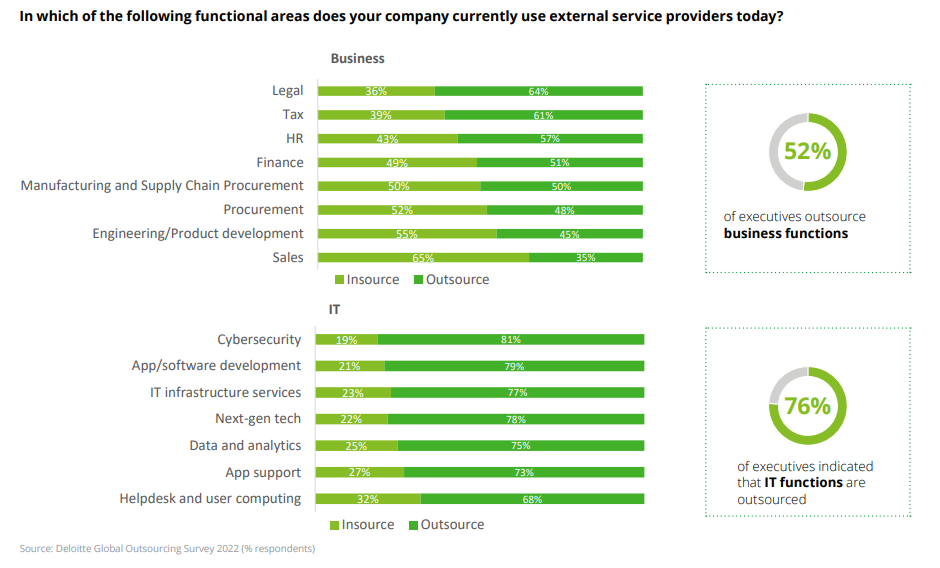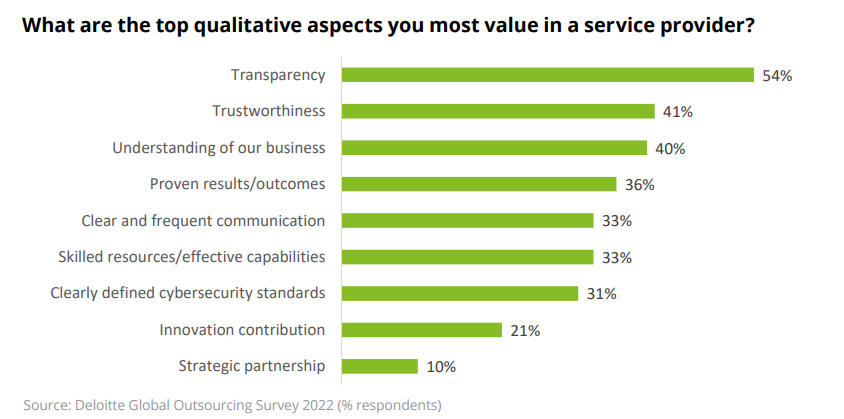Topics: Back-office Outsourcing Services, Business Process Outsourcing, Finance & Accounting Outsourcing, Finance and Accounting Outsourcing Services, Outsourcing
The ROI of Outsourcing: How to Measure the Impact on Your Business
Posted on April 13, 2023
Written By Siddharth Sujan

In recent years, the business world has undergone a significant transformation, and outsourcing has not been immune to its impact. What was once a simple cost-cutting strategy has evolved into a strategic decision for executives, especially in areas such as finance, accounting, HR, and IT.
By outsourcing these functions, companies can prioritize their core competencies while simultaneously reducing costs, improving efficiency, and accessing specialized knowledge. However, heightened expectations and an unstable business environment have made it crucial for organizations to closely monitor their outsourcing efforts to ensure they yield the anticipated ROI and contribute to their overall growth.
Let us try to understand the significance of ROI in outsourcing and how to measure its impact on your business.
What is ROI of Outsourcing?
The ROI of outsourcing refers to the calculation and evaluation of the financial return on investment that a business achieves by outsourcing specific functions or processes to an external provider. It involves comparing the costs associated with outsourcing against the benefits it provides, both tangible and intangible. This is critical in determining the effectiveness of the outsourcing strategy and its impact on the overall financial performance of the organization.
Why is Measuring ROI of Outsourcing Important?
Measuring the ROI of outsourcing is crucial for any business that wants to remain competitive in today’s fast-paced and ever-changing business environment. The potential benefits of outsourcing are immense, as it has the ability to fundamentally transform the operations and growth trajectory of businesses. However, without a proper evaluation of the ROI, it is difficult to determine whether the outsourcing project is delivering the expected benefits.
Moreover, measuring the ROI of outsourcing enables businesses to make informed decisions about which functions or processes to outsource in the long run. By identifying the areas where outsourcing can provide the most significant ROI, businesses can prioritize initiatives and allocate resources more effectively.

What are the Most Common Challenges in Measuring the ROI of Outsourcing?
Determining the ROI of outsourcing can be a complex and challenging process for businesses. Some of the main challenges that organizations may face in determining the returns on investment include:
- DIFFICULTY IN QUANTIFYING BENEFITS: One of the key challenges associated with measuring the ROI of outsourcing stems out of the difficulty in assigning a numerical value to certain intangible benefits, such as improvements in customer satisfaction or quality. The inability to quantify these benefits may also lead to a lack of clarity around the effectiveness of the project strategy and hamper the ability to make data-driven decisions.
- LACK OF DATA: An accurate evaluation of the ROI of outsourcing requires comprehensive and reliable data on both, costs and benefits. The absence of sufficient data can pose significant challenges in accurately quantifying the ROI and undermine the credibility of the outsourcing strategy.
- COMPLEX AGREEMENTS: Outsourcing agreements can be complex, involving multiple service providers, different service levels, and various performance metrics. These complexities not only make it difficult to assess the effectiveness of the outsourcing strategy but can also lead to a lack of clarity around the actual ROI derived from outsourcing.
- LACK OF EXPERTISE: Calculating the ROI of outsourcing requires expertise in areas such as finance, accounting, and data analysis. The lack of such expertise in-house or the failure to work with an experienced outsourcing partner can significantly hinder the ability of businesses to assess the ROI of outsourcing accurately.
- RESISTANCE TO CHANGE: Businesses that are unwilling to invest the necessary time and effort required to quantify the ROI of outsourcing may miss out on the potential benefits of outsourcing and limit their ability to optimize their overall operational efficiency.
How to Measure the ROI of Outsourcing for Your Business?
Assessing the return on investment of an outsourcing project is a complex endeavor that entails various aspects and may differ from one organization to another. Below are several common methods used by companies to gauge the ROI of their outsourcing projects:
- ASSESS PRODUCTIVITY GAINS: Outsourcing has emerged as one of the most effective tools for increasing productivity and streamlining business processes. Measuring productivity gains, such as faster turnaround times and improved service quality, is crucial to assess the impact of outsourcing on overall business performance.
- ANALYZE COST SAVINGS: Despite the strategic benefits that outsourcing offers, cost optimisation continues to be one of the key drivers for businesses to team up with external partners. To determine the true ROI of outsourcing, businesses must assess the cost savings achieved by outsourcing compared to performing the function in-house. This analysis should factor in all relevant costs, including staff, infrastructure, and overheads, amongst others.
- CALCULATE REVENUE GROWTH: Outsourcing can have a profound impact on revenue growth, as it empowers businesses to concentrate on their core activities and pursue growth opportunities. To measure the true influence of outsourcing on the bottom line, it is essential to analyze the revenue growth both before and after outsourcing.
- DETERMINE INTANGIBLE BENEFITS: It is crucial to recognize that some benefits of outsourcing go beyond cost savings and may not be easily quantifiable. Therefore, it is essential to evaluate intangible benefits like enhanced agility, flexibility, and innovation that outsourcing can bring to your business. These factors can have a significant impact on your ROI and must be considered when assessing the overall value of outsourcing.
- EVALUATE CUSTOMER SATISFACTION: Outsourcing can have a significant impact on customer satisfaction levels. Consider conducting surveys or gathering feedback from customers to gauge their satisfaction with the outsourced function and its impact on their experience with your business.
How to Pick the Right Outsourcing Partner & Maximize ROI?
By now we know that outsourcing can is a smart strategy for businesses looking to improve efficiency, reduce costs, and stay competitive. However, choosing the right outsourcing partner is crucial to maximize ROI and achieve business goals.

Here are some tips on picking the right partner and getting the most out of your outsourcing investment.
- EVALUATE EXPERTISE: Look for outsourcing partners with relevant experience and expertise in the areas you want to outsource. Check their track record of success, case studies, and customer testimonials to ensure they have a proven record of delivering results.
- CHECK INFRASTRUCTURE & TECHNOLOGY: Make sure your outsourcing partner has the necessary infrastructure and technology to support your business requirements. This includes communication tools, data security measures, and access to the latest software and hardware.
- VERIFY FLEXIBILITY & SCALABILITY: Your outsourcing needs may change over time. Make sure the outsourcing partner can quickly adapt to your changing requirements and scale their services as needed.
- ANALYZE PRICING MODELS: Compare pricing structures of different outsourcing providers and evaluate their cost-effectiveness. Don’t just focus on the price, but also assess the quality of their services and the value they provide.
- EVALUATE COMMUNICATION & REPORTING: Clear communication and regular reporting are essential for successful outsourcing. Check if the outsourcing partner has a reliable communication protocol and reporting mechanism in place to keep you informed.
Final Thoughts
Measuring the ROI of outsourcing has become increasingly important in the current fast-paced and unstable business environment. The ability to evaluate the financial return on investment of outsourcing is critical to determine the effectiveness of the outsourcing strategy and its impact on the overall financial performance of the organization.
Despite the potential benefits of outsourcing, businesses do face several challenges in determining the ROI of their outsourcing initiatives. Businesses must, however, adapt best practices and ensure that they pick the right partner maximize ROI and achieve their business goals. By closely monitoring their outsourcing efforts and evaluating the ROI, businesses can make informed decisions about which functions or processes to outsource in the long run, prioritize initiatives, and allocate resources more effectively.
Originally published Apr 13, 2023 07:04:17, updated Apr 07 2025
Topics: Back-office Outsourcing Services, Business Process Outsourcing, Finance & Accounting Outsourcing, Finance and Accounting Outsourcing Services, Outsourcing







